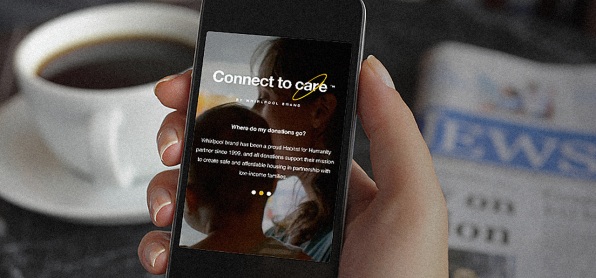How To Clean And Freshen A Washing Machine
As a consultant and blogger who works from home, I get to handle the family's laundry. Sorting through the clothes, I often think: "If only there was a way for me to do laundry and give back to good causes at the same time. I want to save the world before my clothes hit the spin cycle."
Of course, no one has ever thought this, including me.
But that hasn't stopped Whirlpool from introducing a new washer and dryer that allows users to give back with every load. You may never have wished that you could support a cause with every load of laundry. But Whirlpool's new Connect to Care program just might get you asking why you're not donating money to hungry children every time you open your fridge, or donating heating oil to a needy family whenever you adjust your thermostat.
A Washer with a Heart
Whirlpool's Connect to Care is a new program that lets you control your washer and dryer from a mobile app on your smartphone. You can start the washer from work, and time the ending of the dryer cycle so your clean pajamas are still toasty when you put them on.

This warm feeling will only be enhanced by knowing that your latest load supported Habitat for Humanity. The app allows you to set repeat donations for as little as ten cents per load. After you enter your credit card, you can track how much you've donated for the month and overall. Total donations raised from the program are also shown. Finally, you can tell the world on Facebook or Twitter that your conscious–and your clothes–are clean.
"We study how individuals give and get care, and never use technology in a product that does not provide a useful, real benefit to the person using it," says Jon Hall, a senior brand manager at Whirlpool.
The Rise of the Internet of (Good) Things
By 2020, there will be 30 billion objects connected to the Internet. That's four connected objects for every man, woman and child on the planet.
Everything will be connected to the Internet: cities, cars, buildings, for sure. But also toothbrushes, blenders, toasters and, well, even your dog. In addition to being wired to your smartphone, these things will be tied to something else: social good.
A special tag on your dog's collar will send you an email or text when your pooch wanders outside your yard. Of course, GPS and a companion mobile app will show your dog's exact location. A tag that keeps track of your dog means fewer chances for mischief and unwanted offspring. That's a good thing, right? And because the company that makes the dog tag is a supporter of the ASPCA, you get smartphone alerts on cute dogs at nearby shelters. Also, because the dog tag allows you to define the area your dog stays in, you can make a donation to ASPCA every time your dog strays outside the area – or stays in it!
This means objects as common as a dog collar will be deeply connected to our smartphones and lives–not to mention our cause-related goals and interests.
Millennials Have Turned the Dial to Good
Born after 1980, Millennials may be the most socially conscious generation in American history. They expect companies to meet their high standards with responsible and impactful programs.
For companies that heed the call of Millennials, the benefits are clear. According to MSLGROUP's The Future of Business Citizenship, four out of five Millennials want companies to get involved in solving social issues, and two-thirds will reward good business citizens with loyalty and positive word of mouth.
Last year, lower-than-expected earnings for warehouse club Costco raised concerns its customer base didn't include enough Millennial shoppers. Costco and others cannot survive without the largest generation–80 million people strong here in the U. S. alone. Another victim is golf. Millennials playing golf fell 13% over the past five years, an embarrassing bogey for the sport.
Millennials are natural do-gooders, but they're not alone. A global survey by Edelman's Good Purpose study showed that 87% of human beings believe businesses should place at least equal weight on profit and purpose.
Baby Boomers and Gen Xers (and the to-be-named generation that was born after 2000) are not far behind Millennials in their commitment to supporting causes and driving social change.
The good washer is just the beginning. Soon, the Internet will be full of good things set for social change. Cleaning up the world is a big and dirty job. A washer is a good place to start.
How To Clean And Freshen A Washing Machine
Source: https://www.fastcompany.com/3041050/a-washing-machine-that-cleans-your-clothes-and-your-conscious-is-the-start-of-the-internet-o
Posted by: desimonedoothis.blogspot.com

0 Response to "How To Clean And Freshen A Washing Machine"
Post a Comment